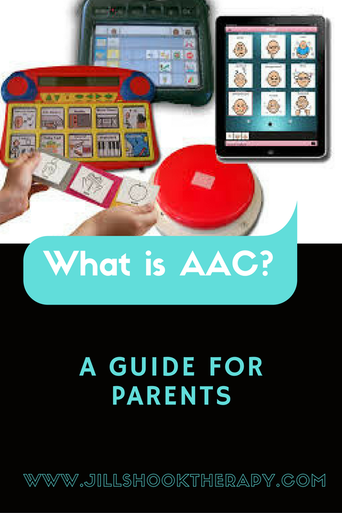|
If you follow my Facebook page, you have probably seen a lot of links that have to do with AAC. You may be wondering, "What is AAC? Is she just saying the ABC's wrong?" Well, AAC stands for Augmentative and Alternative Communication. According to ASHA, it " includes all forms of communication (other than oral speech) that are used to express thoughts, needs, wants, and ideas. We all use AAC when we make facial expressions or gestures, use symbols or pictures, or write." So, AAC is basically using any method other than speaking to communicate. If you sent a text today, you used AAC! There are two major forms of AAC:
Who can use AAC? Everyone uses AAC at some point! Some people use AAC to augment their own speech, which might be difficult for strangers to understand (which is where the "augmentative" part of the title comes from), while others may use AAC as their primary means of communication. Common disorders that create a need for AAC include
How can AAC help my child? AAC can help everyone! As I mentioned above, we all use AAC! I often introduce signing when I work with toddlers because it helps them to communicate before they have the words to do so. Typically developing kiddos as well as those with communication needs can benefit from being able to get their point across! For more information about singing with your child, Heidi Hanks, the SLP behind Mommy Speech Therapy and Little Bee Speech, has a great post about it here. All forms of AAC help your child feel more confident when communicating with others, reduce their frustration with not being able to communicate clearly, and above all, give them a voice! How do I know if my child needs AAC? The first step in the process of deciding if your child would benefit from AAC is a comprehensive evaluation, which can be performed by your child's school if your child is school aged or through an Early Intervention agency such as the Alliance for Infants and Toddlers if (here in Pittsburgh; most other states have early intervention centers as well) if they are not yet 3 years old. I also highly recommend the ICAN Talk Clinic at the AAC Institute (here in Pittsburgh) for evaluations of medically fragile or multiply disabled students. This evaluation will help you and your child decide what the right AAC method or device is for them, as well as the best way to access it. There are a lot of options and access methods out there! How can an SLP help my child use AAC? After the evaluation, the SLP will work with your child to learn how to use their device- from programming it with favorite words and names of family members to personalizing the voices and word colors (if possible based on the device). If your child attends school, an SLP will work with them there to use their device across the school day, training teachers and other school employees in how to help your child use their device to the best of their ability. If you want to see speech-generating devices in action, the AAC Institute has a video of their summer camp for AAC users. I've volunteered there for the past 2 years, and it is an amazing program! If you have any questions about AAC or your child's communication, please contact me via the comments, my email, or my Facebook page! Happy talking! Comments are closed.
|
About MEI'm Jill! I love to create and blog about fun, evidence-based resources that make the lives of parents and busy SLPs easier.
�
Archives
February 2018
Categories
All
|


 RSS Feed
RSS Feed